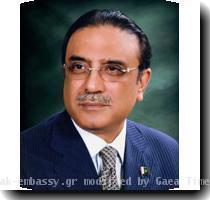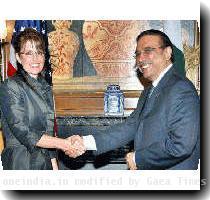Pakistan’s president under pressure to step down or relinquish powers amid Taliban fight
By Asif Shahzad, APSunday, November 29, 2009
Pressures on Pakistan’s president mount
ISLAMABAD — Pakistan’s unpopular president is coming under increasing pressure from the powerful army and political opponents to resign or relinquish most of his powers, fueling political turmoil just as the West wants the country to focus on the threat posed by al-Qaida and the Taliban.
An amnesty protecting President Asif Ali Zardari and several of his key allies from graft prosecution expired Saturday, raising the possibility of legal challenges to his rule and triggering calls from the major opposition party for him to step down.
Hours earlier, he relinquished command of the country’s nuclear arsenal to the prime minister. He has said he will also give up some other powers inherited from his predecessor, former military leader and President Pervez Musharraf.
The upheaval comes as the Obama administration is expected to announce this week a new strategy for defeating the Taliban in neighboring Afghanistan and on Pakistan’s western border. Any new approach will need political stability in Pakistan to have any hope of succeeding.
A military coup to oust Zardari appears unlikely, as does impeachment, since he heads the largest party in Parliament. The opposition has not called anti-government street rallies, perhaps wary of pushing the country into chaos and paving the way for another stint of military rule.
Zardari, 54, is languishing in opinion polls just 15 months after taking office. He has long been haunted by corruption allegations dating back to governments led by his late wife, Benazir Bhutto. He denies accusations that he took kickbacks that saddled him with the nickname, “Mr. 10 Percent.”
He also has found himself locked in a power struggle with the powerful military, which has objected to his overtures toward nuclear-armed rival India and his acceptance of a multibillion dollar U.S. aid bill that came with conditions some fear impose controls over the army.
Zardari’s office said the decision to transfer control of the National Command Authority to Prime Minister Yousuf Raza Gilani was a step toward ceding sweeping presidential powers that had been adopted by Musharraf. The authority comprises a group of top military and political leaders who would make any decision to deploy nuclear weapons.
In an interview Friday with a local television station, Zardari said he was also likely to relinquish the authority he inherited from Musharraf to dissolve Parliament and appoint services chiefs by the end of this year — as the opposition and civic activists have long demanded.
That would reduce his job to a more ceremonial role, but would lesson some of the pressures on him to step down.
Speculation over Zardari’s future has escalated after he was forced to abandon an effort to get Parliament to approve the amnesty passed by Musharraf that granted more than 8,000 bureaucrats and politicians — including the president and many others from his Pakistan People’s Party — immunity from a host of corruption and criminal charges.
The amnesty list was part of a U.S.-backed deal to allow Prime Minister Bhutto to return from exile in 2007 and run for office safe in the knowledge she would not be dogged by corruption allegations. The U.S. and other Western nations supported the bid by Bhutto, who was seen as a secular and pro-Western politician.
But Bhutto, who was forced from her post twice in the 1990s because of alleged misrule and corruption, was killed by a suicide bomber shortly after she returned to Pakistan. Zardari took over as co-chairman of her party and was elected president in September 2008 by federal and regional lawmakers.
Tags: As-pakistan, Asia, Asif Ali Zardari, Bribery, Graft And Conflicts Of Interest, Islamabad, North America, Pakistan, Political Corruption, Political Issues, South Asia, United States

